#harvey weinstein can CHOKE
Note
You’ve been vocal about the jonathan majors case. I’m curious how you feel now with all the information that we have. Do you still support him? Do you believe any of the negative things about him?
Definitely didn’t mean for this to be so long. I have so much more to say but i think i’ve said enough lol
I have so many questions so Im looking forward to the trial. Since the beginning I’ve vocalized my belief that we’re innocent until proven otherwise and I still stand by that today. I hope he’s innocent. I want him to be innocent because I was really rooting for him. He’s extremely talented I just knew he was gonna win. From what I know so far about the evidence Majors has, he seems innocent. But I’m interested in what the DA has because the case hasn’t been dropped. And the fact that it hasn’t doesn’t necessarily mean that he’s guilty. I just can’t fathom him being this abuser I’m sorry. I know I don’t know him but I believe him when he said “this acting thing is it” so I can’t see him doing anything so heinous as it will affect his career.
I admit to wondering, why would she accuse him of abuse if he’s innocent? Why say he choked you if he didn’t? What’s with the location change?
When I first read the Rolling Stone article, I thought ‘okay what does this have to do with this case.’ Just because a person is rude or a jerk doesn’t mean they’re an abuser. Also, why try to ruin someone’s career because they were mean to you? This must be an attack on his character. My second thought ‘i hope theres proof because this seems slanderous.’ I thought it was funny how 40 people spoke to the journalist but only 1 was willing to go on record. So we can say anything without proof and it just gets published as if it’s fact? That’s so weird to me.
I can’t speak on the past abuse allegations because I don’t know but I find it strange that there isn’t any shred of evidence of this happening. No pictures, no police reports just hearsay from someone who knew this person who knew that person who knew the alleged victim. Like what? Lol. The article said they reached out to 6 character witnesses for Majors and 1 said it was a premade statement. Why would his team give you fake statements knowing that you were gonna reach out? I just don’t understand. I also don’t understand why people are acting as if Majors is somebody who has all of this power. I can see in the Harvey Weinstein and Cosby case of being afraid to speak up out of fear of not being believed or fear of retaliation or career suicide, but Majors? I like the actor but he isn’t anybody lol.
Now one thing mentioned in the article that I whole heartedly believe are the allegations on the Magazine Dreams set. I’ve seen videos and read comments of people accusing Majors of gaslighting with the method acting excuse. I don’t know if he physically touched someone on set but I know for a fact that he really does method acting. He’s said this several times and so has others who’ve worked with him. Things that I saw and heard from interviews I can believe that he sometimes make people uncomfortable on set. Still that doesn’t make him an abuser.
Again, I have so many questions but I do believe he’s innocent. If I’m wrong and he’s guilty of being this manipulative abuser 💔 he should face the consequences and get help. If I’m right and he’s innocent, I pray he recovers from this.
4 notes
·
View notes
Text
there are countless reasons to wish death upon harvey weinstein, but the latest reason, I’ve discovered, is that he sabotaged Snowpiecer’s blockbuster release, which has completely robbed me of a Snowpiecer fan base or any potential fan fictions. a crime truly punishable by death via covid-19.
#snowpiercer#😔#bong joon ho#covid-19 is doing our dirty work#i am genuinely upset#harvey weinstein can CHOKE
4 notes
·
View notes
Photo
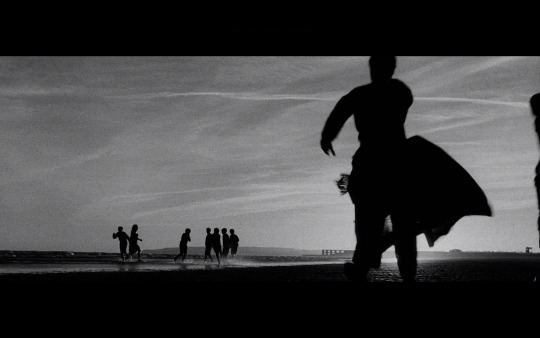

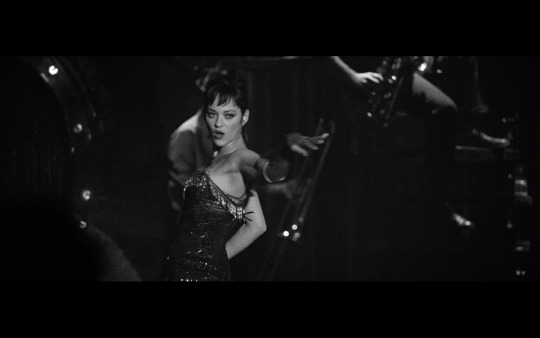
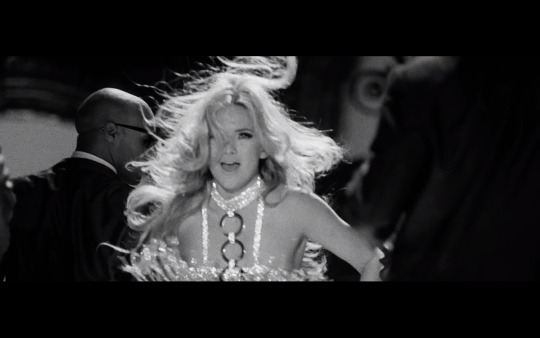
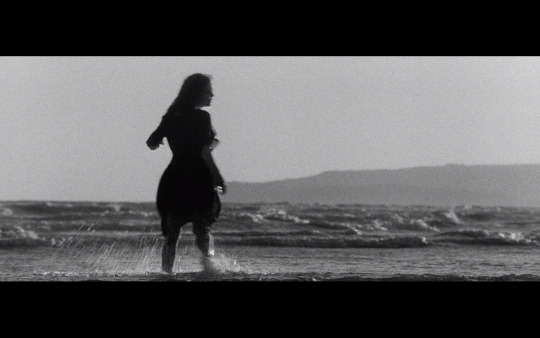
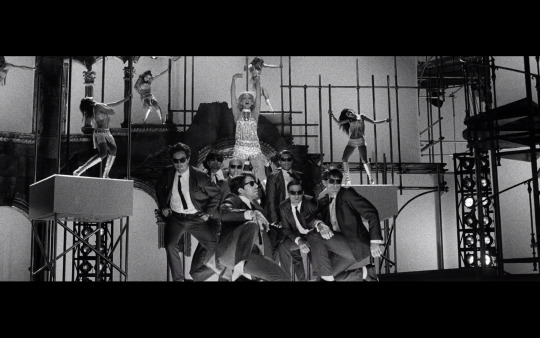
Black and White in Nine (2009)
Cinematography by Dion Beebe
#nine#rob marshall#dion beebe#black and white#film#marion cotillard#fergie#kate hudson#i just like these shots#harvey weinstein can choke tho x
2 notes
·
View notes
Text
honestly I’m still reeling from that one reply to my celebration of a TERF who was actively spouting violent hatred towards trans people leaving tumblr with “but she made good art tho”
I’m usually not one to use words like “cis privilege” but this seriously is just that. it’s the luxury of excusing hateful slander such as:
saying that lesbian transwomen “molest [cis] lesbians”
depicting transwomen as violent lunatics with bloody knives shouting “KILL TERFS” “THEY DESERVE VIOLENCE” “AND A SLOW, TORTUROUS DEATH!”
depictions of violent death of trans people like turning them into minced meat or boiling them alive in a cauldron
an actual picture with the headline “TRANSGENDERS ERASE WOMEN”
among other gems
because the person also made some decent fanart of a cartoon kid’s show.
Like...are you serious? Is that *really* what you’re taking away from this? You really think all of the shit I just listed is excusable because that’s not the only thing they made?
#its kinda like saying ''well harvey weinstein made some cool movies tho''#seriously??#terfs can still choke#my stuff#rant#purposefully not naming names because i DO NOT want someone to get attacked but. yall im so tired
43 notes
·
View notes
Text
‘Harvey Weinstein has been accused of sexual harassment’
All of Hollywood:

#the only people i have any respect for are those who admit they knew or heard rumours#everyone else??#can fucking choke#rose mcgowan is a hero#rape tw#abuse tw#harvey weinstein
35 notes
·
View notes
Text
So, i forced myself to watch Leaving Neverland...
And i swear, i've never hated some stangers in my life to the point where i want them dead. I felt my oxygen leave me and i was choking on my fucking tears from all the lies. I felt so sick, that i puked 5 times. But now i've recomposed myself so that i can expose these liars.
I didn't want to go back in time and know how in feels to be a moonwalker in 1993. I wanted people to still talk about Michael, but not like this, never like this.
First things first, as Michael Williams, stated on Twitter, Michael has been investigated from the FBI for 13 fucking years.
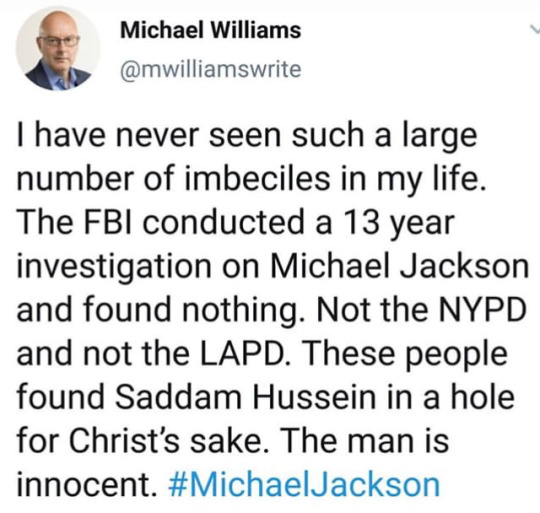
Here we see 72 officers and 50 FBI agents in the Neverland Ranch in Santa Barbara. They searched every angle and interviewed everyone to find evidence and guess what? They found nothing.
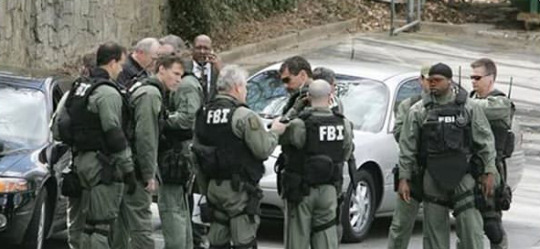
He's been proved innocent at not 1 but 2 trials. To this day, there's still no valid proof that Michael did any of those things.
Even Michael’s fucking bodyguard stepped in to defended him and expose Wade.
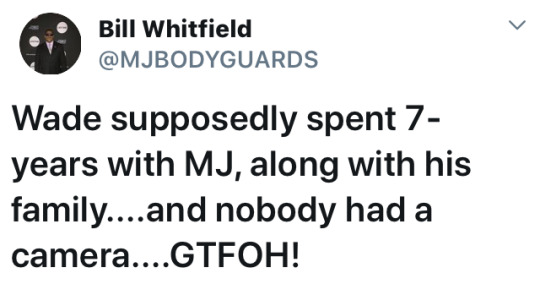
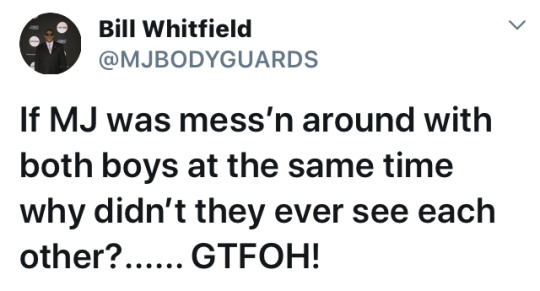
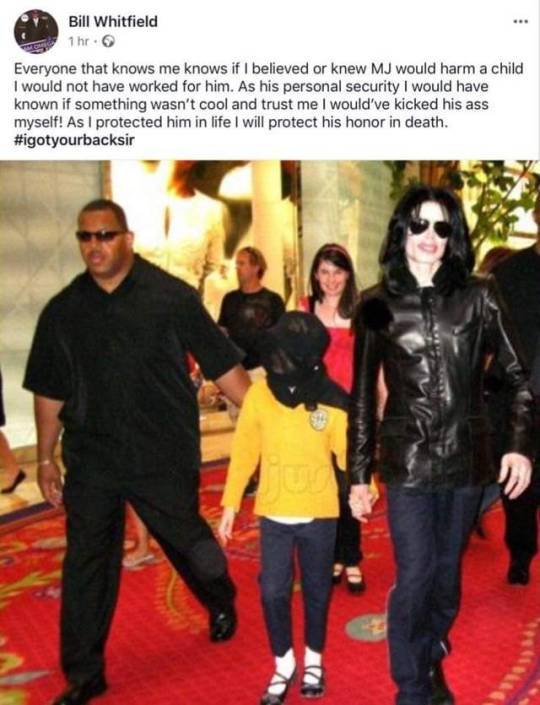
Here's some of the bullshit they said in that documentary, Let's start with James Safetruck:
James: "I've spent Thanksgiving in 1987 with him at his home" Wrong, Michael was in Australia as a part of the Bad Tour in November 24 1987
James: "Michael didn't want us spending any time with women and cut contact with me after puberty"
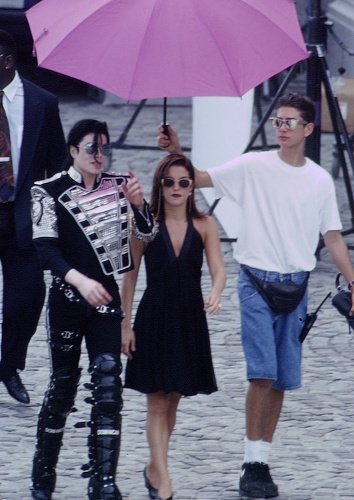
Really James? then how come we see you AFTER puberty holding an umbrella for Michael while Michael's ex wife, Lisa Marie Presley, was there with the both of you.
James: "I was abused by Michael in New York in 1989 after he performed at the Grammys" Fake. The Grammys were in Los Angeles and Michael didn't perform at the Grammys in 1989.
Now let's go with Wade Robson
Wade: "I was molested by Michael between ages 7 and 14" Wade is now 36 so it happened from 1989 till 1996. So you're telling me that these "rapes" happend DURING the Chandler investigation and DURING Michael's marriage to Lisa Marie Presley as well? and the FBI found nothing? really? bitch please.
Here comes my favourite lie
Then there's the MANIPOLATED footage of Michael begin honoured at the Regent Hotel and he apparently recorded a message for Wade "on his birthday" where Michael "says" "Hello Wade, today is your birthday"

The video at the Regent Hotel was recorded on the 20th February in 1990 while Wade's birthday in on the 7th of September and the original video was meant for Elizabeth Taylor.
Also Wade and James didn't even really grew up with Michael, they didn't even know Michael that well... they BEGGED to have Michael's attention and since Michael is an angel, they got it. Also i'd like to tell you that it’s the same Wade that DEFENDED Michael not only once, but 3 mother fucking times.


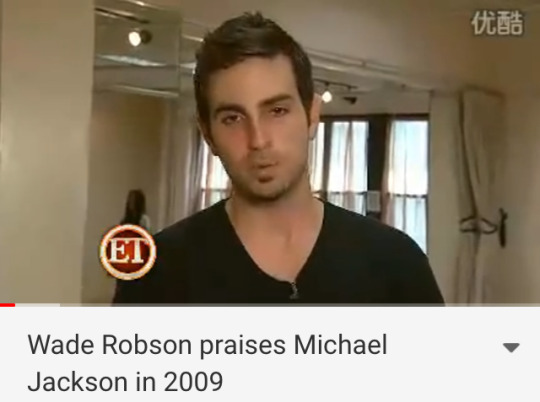
If you two are saying that Michael raped you both, then how come that Macaulay Culkin (the kid from the "Home Alone" movie) the one who literally grew up with Michael by his side, who basically lived at Neverland and was a child like the both of you, said that nothing happened between him and Michael and is still defending him to this day?
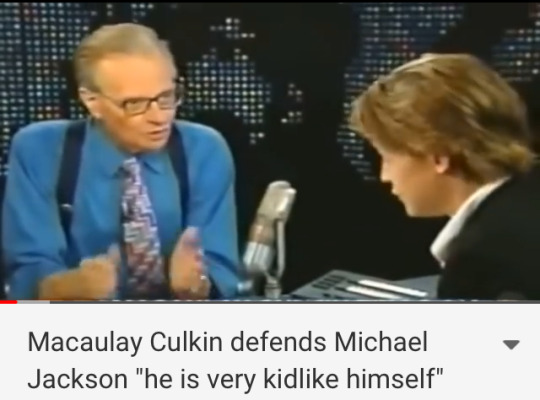
They change their stories every fucking second too. Wade has changed his story 4 times and James 2 times.
Wade's first version of the story: Michael threatened and manipulated him that they'll go to jail if he says anything
Wade's second version of the story: He didn't "realize" he's been abused
Wade's third version of the story: He felt shame
Wade's fourth version of the story: He ALWAYS knew what Michael did but he didn't realize it was bad (because who doesn't have anal sex with kids, right?)
Then there's James:
James's first version of the story: Michael and his people were threatening him to keep quiet and James refused to testify but he and his mom knew he had been abused
James's second version of the story: He didn't realize he was abused till 2014.
They're so worthless that they don't even know how to lie. If you gotta lie about a dead man to earn money, do it properly. It's also funny how they don't mention that Michael was around little girls as well and not only boys, whenever it was on the streets or in Neverland.
Meanwhile Oprah just said "Fuck you" to 3 generations of Jacksons by backstabbing the man who welcomed her in his house by siding with these little shits. Not only Oprah knew, but she provited the “victims”. Also the reason why Oprah promoted "Leaving Neverland" is because at the Sundance, it was also a documentary about Harvey Weinstein, who is an actual pedophile and has been found guilty. But since he's Oprah’s best friend (yes, you heard that right) they just diverted the attention in media to Michael instead of Weinstein
But Wade is the one i hate the most because not only he is a liar but he's also the REAL pedophile... his reputation was so bad that kids at jumpdance called him "Uncle Perv" and the mothers wanted them to stay away from him. Like, there's literally a photo of him side hugging a girl and his left hand is close to her breast while he has his right hand on his fucking dick.

He cheated on Michael's niece, Brandi Jackson (the two have been in a relationship for 8 years) with Britney Spears which resulted in Justin Timberlake's "Cry Me A River" song and he did hard drugs. Not to mention that he made out with his SISTER ON STAGE! and this bastard has a son which i really feel sorry for... but most of all, he's a crazy ass bitch.
Paris Jackson (Michael's daughter) and Taj Jackson (Michael's nephew) are both REAL victims of sexual abuse, stop to think how these two feel about this. Also Taj found texts with Wade in 2009 where Wade is thanking Taj for letting him go to Michael's memorial
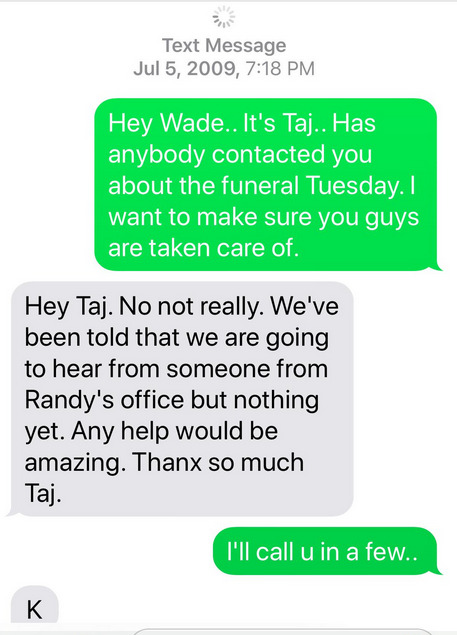
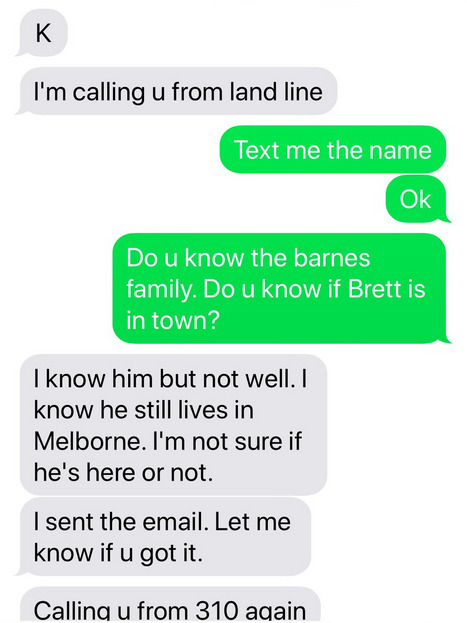
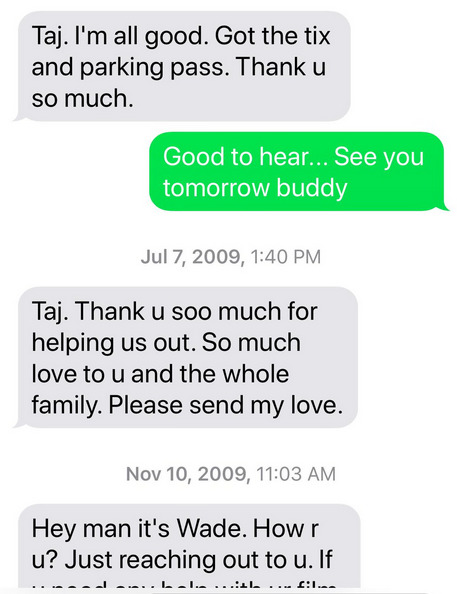
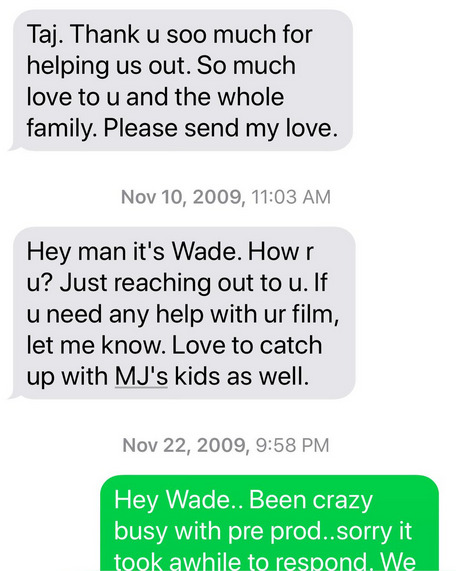
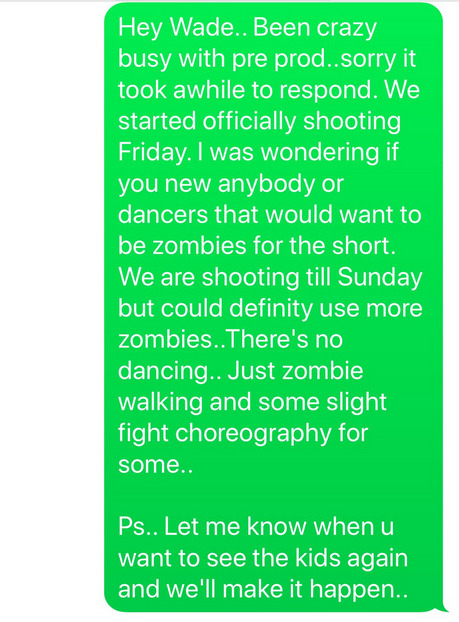
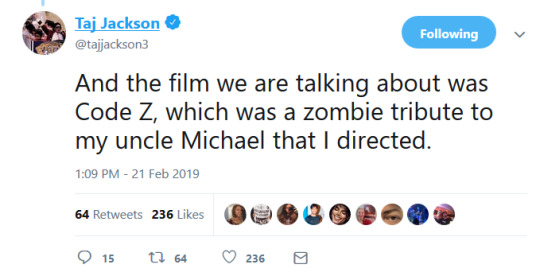
Also Taj recently stated in an inteview that Michael's third son, Bigi (Blanket) Jackson is not talking anymore. And the teachers are worried about him. He literally won't speak, at all.
In conclusion: Michael Jackson is innocent. He’s the real victim.
Please, tell what would lead him to do such a thing?
You're just gonna forget all the money he gave to charity? the many lives he saved? how he considered his fans as part of his family?
I've been a fan of him since i was 4 and i'll love and defend him till i die. This man saved me with his music in my darkest times, i feel protected whenever i see or hear anything related to him, he's my inspiration, my everything and if i could make a dead celebrity come back to life, it would be him... i was meant to go to his "This Is It" concert in July, meeting him for the first time but... it never happened... because he left... i've been called a pedophile supporter just for defending him... do you know how much this hurts? I've seen "moonwalkers" turning their back on Michael like it was nothing... i've been told that i need to accept the fact that my hero is in reality a bad guy, that i'm protecting him just cause i'm a fan.
They made you belive that he bleached his skin when in reality he suffered from Vitiligo and wasn't confident enough to show it to the entire world.
They made you belive that he changed because he had too much plastic surgery when in reality he suffered from Lupus. But even if the did have too much plastic surgery, why should it matter since half of the celebrities have plastic surgery?
They made you belive that he was gay when in reality he has been married to Debbie Rowe, who gifted him with Prince and Paris, and Lisa Marie Presley, he crushed on Diana Ross and Brooke Shields, was kissed on stage by Taitana Thumbtzen aka the girl in TWYMMF (The Way You Make Me Feel) and how to forget his infamous In The Closet song with Naomi Campbell? but even if he was, he’s still Michael.
They made you belive that he was a Junkie when in reality he had many medical illnesses that needed medication and a lot of painkillers.
But most of all, they made you belive that he was a pedophile when in reality he wanted to create the childhood he never had in his adulthood and there's nothing wrong with that, he couldn’t trust adults because instead of seeing him as a human with emotions, they saw him as a cash machine. If it wasn't for the kids, he would have already killed himself, he wouldn’t care to live and he said that he would rather slit his wrists instead of hurting a child.
It's not about defending my idol just cause i'm one of his countless fans, it's about giving a voice to a man who's no longer here to defend himself.
How am i going to belive them since they're accusing Michael Joseph Jackson, the same Michael that didn't want to step on a bug and called his bodyguard to take it while saying "Don't kill it!" while he was performing on stage? the same Michael that would have died for a squirrel?
This man is dead
Attacking a dead man isn't brave.
James Gunn is still alive and he signed with a major studio
Where in everyone in the media?
They are a bunch of pathetic cowards.
So guys please, don't watch this so called documentary cause they are calling:
His ex wives liars
His friends liars
The people who worked for him for over 20 years liars
His fans liars
His FAMILY liars
But they want you to just belive the word of two proven liars.
It’s been almost 10 years since we lost him.
Wake the fuck up.
Can’t belive we’re in 2019 and you decide now that he’s guilty for something he never did.
Evan Chandler forced his son, Jordan Chandler, to accuse Michael for money. Then when Michael died, Evan regretted it so much that he hanged himself. I'm waiting for Wade, James, Oprah, Martin, Connrad and everyone who belives them to do the same thing since they're all nothing but a waste of air.
But don't you worry cause Taj is making a TRUE documentary that proves Michael's innocence and once it's released, they will watch their lifes crumble into tiny pieces with their own eyes and i will be there, smiling while eating pocorns.
Anyone who’s a brain washed moron who don’t belive that Michael is innocent or even thinks of calling me a pedophile supporter needs to fuck off right fucking now because you will be attacked visciously, blocked and reported so
DO
NOT
BOTHER
ME
In case you didn’t understand, i’ll gladly repeat in a more vulgar way since it’s the only way you can all communicate with other people
DUMBASS BITCHES DO NOT INTERACT WITH ME! STAY THE FUCK BACK!
You guys don’t bother to do your research, you should hear both sides of the story to come to a conclusion instead of going along with everything they say. You all eat their plate of lies just like you eat your mother’s food at lunch time. You don’t ask yourself “Are they lying to me?” no, you just go along with every single fucking thing they say cause you’re dependent from the Media.
Face it, we are in the right and we’re going to win this battle. Also, these people without Michael in their lifes, would have been nothing.
PS: Someone needs to tell Wade that fantazing about having Michael's dick in his mouth at age 11 in not normal.
Now i want you all to blast at all volume the songs Money, Tabloid Junkie, Morphine and Leave Me Alone in honour of these good for nothing liars as you read this post of them begin exposed from head to toe by me
700 notes
·
View notes
Link
In the same New York Times interview that alleged Harvery Weinstein had a history of assaulting her, Uma Thurman also spoke out against the dehumanizing experience of shooting the Kill Bill films. Specifically, Thurman claims she was pressured by director Quentin Tarantino into shooting the popular convertible scene — or, the moment when she starts driving to kill Bill — by herself and with no stunt driver, despite Thurman expressing multiple times that she wasn’t comfortable operating the vehicle in its shoddy condition. “Quentin came in my trailer and didn’t like to hear no, like any director,” she said. “He was furious because I’d cost them a lot of time. But I was scared. He said: ‘I promise you the car is fine. It’s a straight piece of road. Hit 40 miles per hour or your hair won’t blow the right way and I’ll make you do it again.’ But that was a deathbox that I was in. The seat wasn’t screwed down properly. It was a sand road and it was not a straight road.”
The subsequent moments confirmed Thurman’s worst fears: While wrestling with the car, it veered off the road and hit a tree at a high speed. (The video can be watched here.) She was badly injured, and needed time to recover. “The steering wheel was at my belly and my legs were jammed under me,” she recalled. “I felt this searing pain and thought, ‘Oh my God, I’m never going to walk again. When I came back from the hospital in a neck brace with my knees damaged and a large massive egg on my head and a concussion, I wanted to see the car and I was very upset. Quentin and I had an enormous fight, and I accused him of trying to kill me. And he was very angry at that, I guess understandably, because he didn’t feel he had tried to kill me.”
Three reasons why Quentin Tarantino is an asshole:
1. Women told him that Harvey Weinstein sexually attacked and harassed them and he did nothing (Uma Thurman and Darryl Hannah).
2. He insisted Uma Thurman do a dangerous stunt that she repeatedly asked not to do which left her with a concussion, permanent neck injuries and knee pain. Then he hid the footage for 15 years so that Uma couldn’t sue Miramax for injury.
3. During shooting, Tarantino took over the roles off camera of the men who abuse Uma so he could choke her with a chain and repeatedly spit in her face. Her director/boss made sure he was the one abusing her.
48K notes
·
View notes
Text
BoJack Season 5: Feminism & Forgiveness

A little over a week ago, BoJack Horseman debuted its fifth and perhaps most powerful season. As an avid fan since season one, there are times BoJack hits me sideways and the only way I can process the emotions it’s left me reeling with is to write it out. Please note there are SPOILERS AHEAD!
Season four dug up BoJack’s familial trauma to a new extent with flashback episodes from his mother’s childhood; showing how far trauma can interlope across generations. This look into his mother’s past unearthed new empathy for our self-destructing protagonist. Season five delves deep into BoJack’s rampant addictions and inherent lack of ability to set boundaries, particularly with women he has a professional relationship with (Diane, Ana, Princess Caroline, his new costar Gina).
This season was penned prior to the Harvey Weinstein and #MeToo movements that poured out late last year. Season 5 touched incredibly well on the raw realities of feminism within entertainment industry and the men that want to keep women silent. In one episode, BoJack is seen as a venerate feminist, touching upon the notion that more people are willing to get behind a male feminist, than a woman speaking up for herself. Diane is understandably pissed that, throughout the course of her life on the show, we see men (including her ex-husband Mr. Peanutbutter) putting her down for speaking up when she feels something is wrong. However if BoJack comes in to “save the day”, everyone praises him. He loves it, because gets to play the hero and not the victim. Diane says to BoJack “you can leave this life whenever you want. I can’t. I have to stay here.”
Later in the season on a Halloween flashback episode, the show angles on the wrong-doings of the happy-go-lucky Mr. Peanutbutter. The view of this episode flashes to 4 different occasions he went to this Halloween party with four different women. At the start of each night, he is excited and hopeful and blames his “last girl” for being negative and ruining the night, hoping the new girl will be “more fun and easy going”. Each time, we see that it is really the fault of Mr. Peanutbutter not listening to his dates wants and needs. He does not see this, however, and ultimately blames each nights downfall on them not being “fun and easy going”, which in itself is a sexist stereotype of female emotions.
Diane asks him what he thinks the repeated pattern is, to which he asks, “they’re mean?” thus contributing to even a seemingly innocent male’s defensive perception that the woman must be in the wrong and not himself. Diane says to him, “No.You don’t listen. It is annoying that you don’t listen”. To quote Hannah Giorgis from The Atlantic review, “It’s difficult, cathartic television. It feels personal.”
Five seasons in, it definitely feel personal. We feel tied to BoJack. This self-loathing eponymous character somehow earns our empathy season after season, questioning if there’s a point in which he could lose it on his meandering path to forgiveness, most of all of himself. The show’s creator had this to say:
“I’m very interested in the idea of forgiveness. I think it is important for us as people to forgive the people in our lives, and find ways to allow them to redeem themselves, and for us to be able to forgive ourselves and find ways to be better.”
This concept is one of the reasons I’m personally drawn to the show. In one episode they remark how happy endings don’t exist in sitcoms because then there would be no story left. Or if there is a happy ending, it’s simply to a story that isn’t over yet. BoJack has now perpetrated two horrific assaults on women; his encounter with Penny which finally unveils to Diane and his pill-hazed paranoia with Gina…where he chokes her on set.
That episode was particularly hard to watch. It was planned roughly half a season after the “BoJack is a Feminist” episode where he so aptly coins the feminist phrase, “don’t choke women”. While most of the season touched on silencing women within the industry, there were more intimate story lines occurring simultaneously. Such as Mr. Peanutbutter and Diane’s divorce, Todd figuring out his own personal relationships and career, and the bottle-necked monologue episode where BoJack gives a 25min euology at his mother’s funeral with the summation, “my mom died, and all I got was this churro”.
I am profoundly impressed, season after season, how this show has yet to get stale or veer off in a distasteful direction. BoJack ends the season by finally admitting himself to rehab. Diane is sure to point out, “it’s not a cure all” and that he shouldn’t look to it to make his life better overnight. Rather, it’s a way to “be responsible for [his] own happiness,” to quote Diane from the season one finale. I’m curious to see if and where, BoJack’s story and relationship with the women in his life will continue from here.
#bojack season 5#bojack horseman#bojack#bojack the feminist#bojack thoughts#diane nyguen#mr peanutbutter#netflix#hollywoo#hollywood#metoo#the atlantic#revie#season 5 review#forgiveness#feminism#will arnett#bob waksberg#los angeles#la#entertainment#california#aaron paul
62 notes
·
View notes
Text
not that quentin tarantino was about shit anyway but the fact that he knew about harvey weinstein assaulting all of these women before he was exposed and continued to be his friend and benefit from his own silence for a whole 25 yrs? he and all of his “strong female protagonists” can choke
3K notes
·
View notes
Text
A Conversation With Chuck Palahniuk, the Author of Fight Club and the Man Behind Tyler Durden
Itâs been more than 20 years since Chuck Palahniuk first unleashed Fight Club on the world and simultaneously inspired legions of impressionable young men and appalled their parents. But the themes Palahniuk explored in that book â the emasculation of late-capitalism and the creeping sense of worthlessness and dread that accompanies it â seems more relevant now than it did even back then. Modern men find themselves in a precarious position, where masculinity itself is being (justifiably) re-evaluated, and in some cases, derided as the source of all societyâs ills. And many of them are facing the troubling realization that they will never be as successful as their parents.In response, a substantial number of them have dug in to oppose that evolution â men who seem to worship at the altar of tyler durden, the Fight Club character who was a paragon of unfettered, unapologetic machismo. If Durden were alive today, he wouldnât inspire Project Mayhem â heâd be wearing a MAGA hat, leading a group of disaffected young men through the streets with pitchforks and staging #GamerGate-esque online harassment campaigns. And so, Fight Club seems to be a rallying cry for their anger.MEL recently spoke with Palahniuk about the bookâs influence on the toxic ideologies that have taken hold in our culture today; why he thinks another kind of toxic ideology â toxic masculinity â doesnât exist; the meaning of Harvey Weinstein, Joseph Campbell and John Lennonâs assassination; and how he coined the derogatory term âsnowflake.âA lot of the things you wrote about in Fight Club and revisit in Fight Club 2 seem even more pertinent today than when you originally wrote them more than 20 years ago. Specifically, the disillusionment of men who havenât radicalized but have adopted radical ideologies and the infantilization of the modern workplace. You were able to see the seeds of what has now grown into these very toxic elements in our culture.In Slaughterhouse-Five, thereâs a comment about how many people are being born every day. Someone else responds by saying, âAnd I suppose theyâre all going to want dignity and respect.â This dovetails into a grueling dread that I felt as a younger person â that status and recognition would always be beyond my reach. I think subsequent generations, larger generations, are coming up against that same realization: That despite their expectations, they might never receive any kind of status. And theyâre willing to do whatever it takes at this point to make their mark in the world.It seems like a lot of these movements, though, have seized on the ideas expressed in Fight Club. Theyâve co-opted these things that you wrote about and made it a part of their own ideologies. Do you feel any regrets or resentment about this? Or better put, how does it make you feel when you see menâs rights activists on Reddit quoting your work to rationalize the terrible shit they say online?I feel a little frustrated that our culture hasnât given these men a wider selection of narratives to choose from. Really, the only narratives they go to are The Matrix and Fight Club.Yes, they get red pilled and then they look at tyler durden as the platonic ideal. Exactly. Almost all the narratives being sold in our culture take place in this established, very static sense of reality. We have very few narratives that question reality and give people a way to step outside of it and establish something new. So far, the only two things are The Matrix and Fight Club. I feel bad that people have such slim pickings to choose from.But it almost sounds like you have a certain level of sympathy for these guys as well.I have sympathy in that I was young a long time ago. And I know the terror of worrying that my life wasnât going to amount to anything â that I wouldnât be able to establish a home or create a career for myself. I can totally empathize with that panicked place young people are in.What are your politics?My politics are about empowering the individual and allowing the individual to make what they see as the best choice. Thatâs all Fight Club was about. It was a lot of psychodrama and gestalt exercises that would empower each person. Then, ideally, each person would leave Fight Club and go on to live whatever their dream was â that they would have a sense of potential and ability they could carry into whatever it was they wanted to achieve in the world. It wasnât about perpetuating Fight Club itself. Have people come to you and said, âFight Club helped me realize my potentialâ?In a lot of different ways. Many people decided to, as a permission through nihilism, to go ahead and do the thing that theyâve dreamt of doing. And a lot of fathers and sons were able to connect to this story and express their frustration about what little parenting they themselves got from their fathers. A lot of people think of you as a nihilist. Do you bristle at that label?You know, I am kind of a nihilist, but Iâm not a depressive nihilist. Iâm a nihilist who says that if nothing inherently means anything, we have the choice to do whatever it is we dream of doing. Youâve been known to go after some of your critics throughout your career. Is that something you wish you hadnât done in retrospect?I willingly did it twice. And they were both instances very early in my career. Iâve never done it otherwise, so I can forgive myself for maybe taking actions I shouldnât have taken. But what the hell? I had to learn.This was before social media had taken off, too, and everyone was a critic. What is it like now when everyone can either directly give you praise or tell you what a terrible writer you are and how you should go die in a fire?You have to completely ignore it. Because if itâs all praise, it just gets you high and thatâs not healthy. And if itâs all criticism, it just gets you depressed and thatâs not healthy. So I ignore it as much as I possibly can. And the people who bring me the news, I know those people arenât my friends. Itâs like Nora Ephron, one of my favorite writers, once wrote: It takes two people to hurt you â one person to actually say or do the thing, and a second person to tell you that this thing has been done against you.Both Fight Club and Choke have been made into movies. Did you take any issue with the film versions?No. You know, there is no point. The book will always be there. The film needs to be its own thing; itâs a different medium. It needs to express itself through different aspects of this story. So you canât expect the film to be completely the book.But with Fight Club specifically, there were so many people who got rich and famous and whose entire careers were changed by that movie. I mean, David Fincher became one of the biggest directors in Hollywood afterwards. Is there any type of resentment that people are dining out on this thing that you created and that maybe your role in it has been lost somewhat?Not in the slightest. Because when that movie came out, it was an enormous failure. It was a failure in a way that Blade Runner was initially a failure. It was out of release within maybe two weeks and considered a massive massive tank. Pretty much everyone associated with the movie lost their jobs. It took a year or two of putting together the meticulous DVD to dig that movie back into profitability. Earlier, you mentioned the terror you experienced as a young man about maybe never being successful. But now that you are successful â and I imagine successful beyond your wildest dreams â are you fulfilled? Or do you have the same sense of dread?Iâm very fulfilled. Because I get to work with many gifted creative and passionate people. Thatâs great because we all want to live our lives in the company of other people who love what theyâre doing. Thereâs no better life than that. On the other hand, Iâve started to teach because I do want to be back in touch with what it was like to be that kid who couldnât write a great story. I want to be able to be with those people until they break through and can write something fantastic. I ask because in Fight Club 2, we find that the narrator has successfully put his tyler durden alter ego to the side. He got married and had a kid and is living the American dream in his house in suburbia. But heâs deeply unfulfilled. He worries his wife doesnât love him, and heâs worried his kid doesnât respect him. So tyler durden starts popping back up. To me, that seemed to express that thereâs a certain hollowness or lack of fulfillment in achieving what you want.Itâs funny, it isnât the process of getting stuff, itâs the stuff itself that becomes the anchor. Itâs buy the house, buy the car and then what? Itâs that isolated stasis thatâs the unfulfilling part you ultimately have to destroy. Thatâs the American pattern â you achieve a success that allows you isolation. Then you do something subconsciously to destroy the circumstance because you can come down into community after that. Maybe youâve got this great career where you can do whatever you want, but on the side, youâre sexually harassing and assaulting women. Youâre doing something thatâs going to force you out of the isolation of success. Itâs going to push you back into the community with other people. We like to move between isolation and community and back to isolation again. Are you referencing Harvey Weinstein specifically?Well, whether itâs Weinstein or successful people who abuse drugs or have affairs like Tiger Woods, people always create the circumstances along the way that will destroy the pedestal that theyâve found themselves on. Then they can come back to earth and just be a person among people. Lance Armstrong is another good example.So more of a self-destructive impulse. But is there any way to keep those two things in balance? Can those two things co-exist as a part of a manâs personality? Or are they irreconcilable?Can you build a house on a plot of land without tearing down the house thatâs already there? I think itâs inaccurate to call it self-destructive. In a way, itâs a different form of self-improvement or a different form of creativity. That act of demolition in order to replace the thing with a more profound and better thing.In the book, you also seem to portray suburbia as an affront to masculinity and manhood itself. Do you personally feel that way? I know youâre an outdoorsman and live in a rural area. Is that something that you seek out to maintain your edge?Thatâs a tough one. Because Iâm not so much talking about suburbia as I am talking about this self-isolation that goes back to the whole snowflake metaphor where weâre taught that weâre special and hyper-individualized by being told that weâre unique and innately a treasure. Itâs that idea of ourselves as different that drives us apart from one another. It was only once I realized, No, actually, all of us have far more in common than we have differences, and Iâm not a snowflake, that I recognized myself in other people. Thatâs when I started to write about myself as part of a larger pattern of a larger experience. âSnowflakeâ is an interesting word. Itâs what tyler durden uses to tell men that theyâre not unique or special. But now itâs been coopted by the alt-right as their favorite epithet of liberals and people who have no toughness. Which gets back to what we were talking about beforeâ¦You know, you want people to adopt the thing. You want to put the book in the movie producerâs hand and have them adopt it like a baby, raise it and put a huge amount of energy into it. In doing so, the movie producer is going to change it so that it reflects the movie producerâs experience. And once that material passes on to an audience, the audience adopts it. It will become the child of the audience and will serve whatever purpose the audience has for it. It would be insane to think that the author could control every iteration or every interpretation of their work.So you just feel like an innocent bystander to how itâs being used? You donât feel any type of feeling either way â good or bad?No, I do not. You know, itâs like J. D. Salinger, Catcher in the Rye and the death of John Lennon. I donât think Salinger felt huge remorse that heâd written a fantastic book, and this book was interpreted by a damaged person. Nor do I think it was Salingerâs fault.Thereâs one passage in Fight Club 2 that I found particularly interesting. You write, âThroughout childhood, people tell you to be less sensitive. Adulthood begins the moment someone tells you that you need to be more sensitive.â Is that something that youâve specifically had to work on as youâve grown older?Oh, hell yeah. Itâs one of those little truisms. You have so many people telling you, âDonât be so sensitive.â Then, suddenly one day, it turns around.You seem very soft and gentle over the phone, Iâm surprised that the man who wrote Fight Club seems so tender in his voice. Iâm a much older man now too. Fight Club was 20 years ago for me. It seems like youâre saying that youâve released a lot of the rage you had as a young man.I was going through a huge disillusionment. Iâd been a really good student. I kept my nose clean. I followed this blueprint society had presented to me that said that if I did all these things â get my degree, pay back my student loans and work very hard â eventually Iâd achieve some sort of satisfying success. But it just wasnât working. Around the age of 30, all of that good boy stuff starts to fall apart. You have to make a choice as to whether youâre going to continue along that road, or whether youâre going to veer off that road and find ways to succeed you werenât taught. Thatâs where I was. I was really disillusioned that Iâd been given the same roadmap everyone else was given, but that none of us were finding it effective. We hear the term âtoxic masculinityâ a lot these days. As someone who writes a lot about manhood, what does it mean to you?Oh boy, Iâm not sure if I really believe in it.Why?It seems like a label put on a certain type of behavior from the outside. Itâs just such a vague term that itâs hard to address.Let me take the opposite approach then: Who would be the male role model in todayâs culture? Is there somebody who young men have to look up to as the ideal man and is someone who I should aspire to be like?Joseph Campbell said that beyond a personâs biological father, people needed a secondary father â especially men. Typically that was a teacher, coach, military officer or priest. But it would be someone who isnât the biological father but would take the adolescent and coach him into manhood from that point. The problem is that so many of these secondary fathers are being brought down in recent history. Sports coaches have become stigmatized. Priests have become pariahs. For whatever reason, men are leaving teaching. And so, many of these secondary fathers are disappearing altogether. When that happens, what are we left with? Are these children or young men ever going to grow up?Is that what you fear â that weâre going to have a generation of young men who have never been fully socialized? Who have never been fully taught, not just how to be men, but how to be fully realized people?Iâm not afraid that it wonât happen, because itâs gonna happen. One of the things that I loved about Campbell is that he explained gangs by saying this is what happens when thereâs no secondary father. These gangs are taking young men and giving them impossible tasks, giving them praise and rewards and coaching them to an adulthood. But itâs a negative adulthood. And so, as these secondary fathers disappear for everyone, there will be similar forms that will appear and fulfill that function. But they will coach these young men to maybe more negative manhoods. Yet it also seems like thereâs a lack of universally accepted male role models at the national level. Thereâs no Frank Sinatra or Hugh Hefner anymore â no one who, for better or worse, everyone looks up to. Do you think Iâm wrong in that assessment?I think youâre wrong in that these were maybe not the healthiest male role models to model yourself after. I prefer to think of someone like John Glenn.Okay, Iâll buy that. Is there a modern-day John Glenn?Maybe not on the big, big level that everyone can emulate. But I think that on a more local level, there are teachers who mentor students. The man who taught me minimalist writing, Tom Spanbauer, was very much the master of this workshop of students. And among his apprentices â the people who could produce work that was marketable â bought their way out of his workshop. They achieved a mastery of their own. Iâd like to see more of that happening. Instead of people just being given grades and being given loans to repay. Iâd like to see them actually demonstrate a mastery in something useful in this kind of apprentice/mentor student role.Youâve experienced a lot of death in your life and even volunteered at a hospice for a time. Why were you drawn to something so morbid?It panicked me as a young person to first get a sense of my mortality â that at some point, I was going to be called upon to die. Because I had no idea what it was like to die. By working at a hospice, I was able to see what the process was like â that some people die beautifully and some people die horribly, but that if they could do it, I could do it, too. It gave me a greater sense of ease around the inevitability of dying. Later in life, your father was murdered by the ex-husband of his new girlfriend. When something that terrible and seemingly random happens, how do you try to make sense of it?By using my journalism degree. By going to the trials and talking about all the details. By understanding moment by moment everything that took place. And by establishing a sense of, not quite control, but a sense of having mastered the narrative of what led to what.On another strange and inevitable level, my father had almost been killed as a child. His father had become very upset and killed his mother and himself. But he also tried to kill my father. He just gave up searching for him before he committed suicide. When my father was finally killed by this womanâs ex-husband all these years later, a mattress fell on top of his body as the building he was in burned. The mattress is what preserved his body well enough that they could identify him as my father. Crazy enough, the reason my father survived as a child when his father went insane was that he had hidden underneath a mattress.There were so many coincidences like that. So in a way, my fatherâs death seemed like this perfect circle back to this past event actually coming to fruition. There were just too many odd coincidences to completely ignore them all.And yet, despite all these coincidences, you still identify as a nihilist? Something like that is uncanny. It almost seems otherworldly that there would be that many parallels.Thereâs a choice â you can either identify as a nihilist, or you can try to impose your own belief system on something you donât understand. The latter option says more about controlling other people, and I prefer not to do that. Iâd rather work from a position of nihilism, because I think thatâs the best base for creativity and play.Still, you needed to process your fatherâs murder as a story and have some control of it in order to get past it.I treat storytelling as a digestive function. You ruminate like a chewing animal. And you chew a story over and over again until it has absolutely no emotional reaction, and youâve resolved your emotional reaction to it. First by distancing it as a craft exercise â by turning it into a story â thatâs one step. But the big step is to tell that story over and over again until youâve completely assimilated the event into your identity, and youâve exhausted your emotional reaction. You are no longer used by the story; youâre using the story at that point.You also supported your fatherâs killer being sentenced to death, a sentence that ended up getting commuted. I canât imagine you arrived at that conclusion lightly. Some of the officials showed me documents from this manâs lifetime of incarceration. It was unethical, maybe even illegal, but there were a long string of things that heâd been convicted of doing since childhood. This man had created so much pain and had destroyed so many peopleâs lives that it just seemed like the cleanest way of resolving his life. What was the most important thing that your dad taught you?When I was little, we lived out in the country and had this chopping block where we killed chickens. My father had told me not to put metal washers over my fingers and get them stuck. But I did it anyway. The washer got stuck, and my finger turned black. I went to my father, and he said, âWeâre going to have to cut this off.â It was completely clear to me that it was my fault, that there was a price to pay and that my father was doing me a favor by washing my finger and putting rubbing alcohol on the axe so it would be sterile.When we got to the chopping block, my father had me kneel down and put my finger on it. Then, he swung the axe and missed by an inch. Afterward, he took me inside and took the washer off with soap and water. But in that moment, I was very clear â and Iâve been very clear since â that if things are going to happen in my life, Iâm gonna have to make them happen â and if they donât happen, Iâm going to have to take responsibility. Thatâs one parenting techniqueâ¦He was like a 22-year-old guy. So I donât want to be too hard on him.Thatâs very gracious of you. Nowadays, someone would call DCFS if something like that happened.Again, he was a 22-year-old guy whose father had killed himself and his mother in a murder suicide. Heâd been beaten as a child and had grown up to the best of his abilities. He had no parenting skills. I think he did a marvelous job when you consider his circumstances.Aside from your fatherâs murder, the other big element of your personal life thatâs become public is your sexuality. You didnât, however, come out until 2003. And, in fact, even gave the impression that you were married to a woman. Why?Because of my partner. He doesnât want to be a public person. And the next question they ask you after coming out is, âWho are you with?â So I chose not to go down that road. For the same reasons so many celebrities will refuse to talk about their children â they donât want to make their children into public figures.If you were to start your career today, would you be more willing to come out? I imagine it would be much easier now socially speaking.Iâd probably do it exactly the opposite way. Iâd say no picture on the book. Iâd use a pseudonym like the author of The Hunger Games. Iâd refuse to do any kind of public relations. Iâd keep myself entirely out of the process. Why?Because Iâd like the work to stand on its own and to be judged on its own. Iâve become exhausted with the constant explanation of the work, which I donât think is necessary. Too much of the presence of the author can get between the reader and the story. Afterwards, the reader will no longer see themselves in the story; they will see too much of the author.Thatâs interesting because thereâs a certain kind of bro-y, straight white guy who really loves the Fight Club movie â and the book if they happen to read it. I imagine that theyâre a little surprised when they find out the author is gay. Would you consider that accurate?They are, and they arenât. I donât think itâs a big deal. I also wrote Invisible Monsters, which gay guys love as well as straight women because itâs all about that panicky feeling that this beautiful thing isnât going to be beautiful forever and that youâve got to transition that beauty into a different, more lasting form of power. Thatâs something so many beautiful women face and why people really attach to Invisible Monsters. And so, I think that by the time that book came out, I had such a variety of books in the world that the particulars about me were less important.Youâre really downplaying your own role in this. You donât take pride in the fact that people really resonate with your work and want to discuss it with you?Thatâs because my degree is in journalism. My job is to listen to people at parties and to identify their stories and to find a commonality in the pattern between them. Because when someone tells an anecdote that goes over well, it evokes other people to tell almost identical anecdotes from their own life. Then you choose the very best of these to demonstrate a very human dynamic. In a way, what I do isnât so much invent things as it is identifying them. Later, I just put them together in a report that looks like a novel.You think of your fiction as reporting?It is. I have so little imagination. But I have so much admiration when I hear a great story from someone â the journalist in me wants to preserve it, archive it and honor it in some way.Not long ago, we were talking about male role models, but it just dawned on me that I never asked you who yours was when you were growing up.Dr. Christiaan Barnard. He was a heart transplant surgeon in South Africa. There was an article about him in a magazine when I was a small child, and something about him just completely captivated my attention.Do you know what it was exactly?The idea that he had dedicated his life to heart transplant research but that he had developed arthritis so severe that he could no longer do the work himself. That seemed like such a tragedy and made him infinitely more appealing. John McDermott is a staff writer at MEL. He last wrote about how we need a better name for net neutrality to get people to start caring about it.More conversations:A Conversation With Conner Habib, the Syrian-American Gay Porn Performer and Radical PhilosopherMoments after the solar eclipse peaked over Los Angeles on Monday, I found Conner Habib perched on his porch. We sat onâ¦melmagazine.comA Conversation With Chris KluweThe outspoken former NFL punter whose mouth got him blackballed from pro footballmelmagazine. comA Conversation With Dan Wilson, the âClosing Timeâ Singer Whoâs Written Hits for All Your Favoriteâ¦How the former Semisonic frontman became a hitmaker for womenmelmagazine.comA Conversation With Keith Law, Baseballâs Foremost Intellectual and FirebrandESPNâs sabermetrics guru discusses antidepressants, the importance of logic and his great new book about the future ofâ¦melmagazine.comA Conversation with Langston Kerman, the âInsecureâ Star and Slam Poet-Turned-Standup-ComicLangston Kerman is an L. A. -based comedian who tours the country performing stand-up and is on the verge of starring inâ¦melmagazine.com
0 notes
Link
LOS ANGELES — New York Times opinion writer Nicholas Kristof today published a sensationalistic call for state censorship and financial strangulation of adult tube site Pornhub, packaged around gut-punching testimonials from young victims of sexual exploitation.
What makes this particularly callous is that Kristof actually had the reporting to write a nuanced piece about the substantial problems with content moderation that plague all platforms that depend on third-party content, including YouTube, Facebook, Instagram, XVideos and — yes — Pornhub.
But that's not what Kristof and the editors of the New York Times chose to do, instead turning the piece into a manipulative attempt to insert themselves in the complex debates around Section 230 — the so-called First Amendment of the internet — free speech online and sexual expression among consenting adults, including pornography.
Everything about "The Children of Pornhub" is exploitative, from the testimonials, to the absolutely misguided photo essay taking advantage of a homeless teen to "make a point" and affect policy.
As of this writing, Kristof continues to tweet the victim's photo at public officials in the U.S. and Canada to manipulate them into "doing something" to Pornhub.
What Nicholas Kristof Got Right
These are some facts about Pornhub and the adult industry embedded in Kristof’s opinion piece:
Pornhub is very popular with all kinds of people. According to numbers cited by Kristof (who does not cite his sources) “it attracts 3.5 billion visits a month, more than Netflix, Yahoo or Amazon” and “one ranking lists Pornhub as the 10th-most-visited website in the world”
Pornhub is also a very successful business. Kristof notes (again without providing sources) that it derives income from “three billion ad impressions a day”
Pornhub, Kristof writes, “is owned by Mindgeek, a private pornography conglomerate with more than 100 websites, production companies and brands. Its sites include Redtube, Youporn, XTube, SpankWire, ExtremeTube, Men.com, My Dirty Hobby, Thumbzilla, PornMD, Brazzers and GayTube. There are other major players in porn outside the Mindgeek umbrella, most notably XHamster and XVideos, but Mindgeek is a porn titan”
Pornhub “is like YouTube in that it allows members of the public to post their own videos. A great majority of the 6.8 million new videos posted on the site each year probably involve consenting adults”
Pornhub’s very successful branding and marketing campaigns are built around removing the stigma from adult entertainment, bringing it out of “the darkness at the edge of town,” and deliberately aligning it with progressive and public welfare causes. In Kristof’s words, Pornhub “is the website that buys a billboard in Times Square and provides snow plows to clear Boston streets. It donates to organizations fighting for racial equality and offers steamy content free to get people through COVID-19 shutdowns”
Kristof admits the bold approach to branding and marketing worked. “Pornhub and Mindgeek also stand out because of their influence,” he writes. “One study this year by a digital marketing company concluded that Pornhub was the technology company with the third greatest-impact on society in the 21st century, after Facebook and Google but ahead of Microsoft, Apple and Amazon”
But Pornhub, while a big player in the adult tube site market, is not “a monopoly” or even the only company of its size in that space. “A rival of Pornhub, XVideos, which arguably has even fewer scruples, may attract more visitors,” Kristof notes (again without providing sources)
Pornhub shares complex issues about content moderation with any major user-content reliant company both in mainstream and adult. “Depictions of child abuse also appear on mainstream sites like Twitter, Reddit and Facebook,” Kristof writes. According to data he requested, “Facebook removed 12.4 million images related to child exploitation in a three-month period this year. Twitter closed 264,000 accounts in six months last year for engaging in sexual exploitation of children”
Issues of moderation and filtering are also prevalent in search engines and are part of complex SEO problem-solving. Google, Kristof writes, “returns 920 million videos on a search for ‘young porn’”
Pornhub “has doubled the number of moderators in the last couple of years, the moderator told me, and this year Pornhub began voluntarily reporting illegal material to the National Center for Missing and Exploited Children”
When Kristof asked Pornhub for a comment about some of the claims he and others make in his article, the company stated that “Pornhub is unequivocally committed to combating child sexual abuse material, and has instituted a comprehensive, industry-leading trust and safety policy to identify and eradicate illegal material from our community”
Organizations like the National Center for Missing and Exploited Children (NCOSE) track reports of child exploitation videos, which they can share with law enforcement and internet companies.
Pornhub has also worked with the “Internet Watch Foundation, an England-based nonprofit that combats child sexual abuse imagery.” The tube site company told Kristof through a statement that “eliminating illegal content is an ongoing battle for every modern content platform, and we are committed to remaining at the forefront"
A Salacious, Explotative Call for Censorship
Armed with that information, Kristof then proceeds to bury it within a salacious, deliberately exploitative manifesto that confusingly asks for sweeping international censorship and private liability against a single private company — he explicitly directs his demands to the entire nation of Canada, Prime Minister Justin Trudeau and the American “Congress and successive presidents” — while claiming that “it should be possible to be sex-positive and Pornhub-negative.”
Kristof’s call for politicians and states to step in and “do something” (i.e., effect censorship legislation directed towards one company, but affecting all of free speech online) also includes a number of tendencious misrepresentations, sensationalizing language and outright nonsense:
Pornhub, Kristof writes “is infested with rape videos”
These “rape videos” (which he repeatedly redefines in a very expansive way to include controversial search terms and fictional taboo content shot by consenting adults) are, he claims over and over, somehow a central part of Pornhub’s business model. Kristof’s favorite, vague, go-to word to explain the complex issue of how ad-based platforms make money in 2020 is “monetizes”
According to Kristof, “child rapes, revenge pornography, spy cam videos of women showering, racist and misogynist content, and footage of women being asphyxiated in plastic bags” are all things Pornhub “monetizes.” It should be noted that the first three things Kristof mentions in his grab bag of “monetizeables” are recordings of illegal acts that should be (and usually are) reported to the authorities and to moderators, while “racist and misogynist content, and footage of women being asphyxiated in plastic bags,” if consensual, are protected by the First Amendment
Kristof claims that out of the 6.8 million new videos posted on Pornhub yearly, “many depict child abuse and nonconsensual violence.” The “many” is tendentious here given that Kristof does not provide any concrete data of what percentage it is, how it compares to other adult or mainstream tube sites where bad actors may upload criminal content, or why he is singling out Pornhub for what appears to be an internet-wide issue for any company hosting massive amounts of third-party content
One of several creepy searches Kristof has performed as “research” for his censorship manifesto, yielded “more than 100,000 videos,” of which he says, apparently by his own viewing and estimation “most aren’t of children being assaulted but too many are”
Kristof protests that “the issue is not pornography but rape” and accuses Pornhub of “promoting” “assaults on children or on anyone without consent,” before likening the tube site to “Bill Cosby, Harvey Weinstein and Jeffrey Epstein”
Kristof in his “research” claims that he “came across many videos on Pornhub that were recordings of assaults on unconscious women and girls. The rapists would open the eyelids of the victims and touch their eyeballs to show that they were nonresponsive.” At no point in his article does Kristof clarify whether he reported theses videos to the authorities or the site’s moderators or if he followed up with the company’s response to such a report
Kristof repeatedly and almost universally refers to “women and girls” (presumably cis women) when reporting on the tube site’s content. There is only one mention of a pseudonymous male victim, which is near the end and almost in passing
Kristof repeatedly provides specific instructions and keywords on how to search for potentially criminal videos in the most graphic, exploitative terms, apparently inviting readers to replicate his “research.” Sample passage: “a video of a naked woman being tortured by a gang of men in China." It is monetizing video compilations with titles like ‘Screaming Teen,’ ‘Degraded Teen’ and ‘Extreme Choking.’ Look at a choking video and it may suggest also searching for ‘She Can’t Breathe’”
“If you know what to look for, it’s possible to find hundreds of apparent child sexual abuse videos on Pornhub in 30 minutes,” Kristof writes, again without giving any indication of what the process is to report the material to authorities and to the platform
Besides asking the governments of Canada and the U.S. to effect some form of state censorship, Kristof wants to make sure that Pornhub — and the multitude of sex workers who post their content there — cannot be part of the mainstream financial system and that its users are shadowbanned even further. “Call me a prude,” he writes, “but I don’t see why search engines, banks or credit card companies should bolster a company that monetizes sexual assaults on children or unconscious women. If PayPal can suspend cooperation with Pornhub, so can American Express, Mastercard and Visa”
Echoing Religiously Inspired Anti-Porn Crusades
Kristof’s call for state censorship and defunding of Pornhub is identical to the current crusade being conducted by a well-funded, religiously inspired organization variously called Exodus Cry and Trafficking Hub, a California-based offshoot of controversial Midwestern ministry International House of Prayer (IHoP).
In fact, Kristof mentions the organization’s main mouthpiece in his tirade. “An organization called Traffickinghub [sic] led by an activist named Laila Mickelwait, documents abuses and calls for the site to be shut down,” he writes.
Mickelwait, a single-minded zealot whose life mission is to get someone — anyone — to “shut down” Pornhub, looms large in the background of Kristof’s editorial, as does NCOSE (formerly known as Morality in Media), another well-funded, religiously inspired group which has been waging its own War on Porn since the 1960s.
NCOSE was responsible for the useless, wasteful copycat legislation passed in several Red State legislatures since 2016 attempting to define “porn as a public health crisis.” These performative bills attempted to divert resources from actual public health matters to “porn addiction” groups for training and other services. Since the actual COVID-19 public health crisis began, these efforts have become dormant, with funding by donors interested in the War on Porn being now repurposed for organizations like Exodus Cry and anti-Pornhub crusaders like Mickelwait.
Almost every piece of tendentious misinformation about Pornhub in Kristof’s piece, plus his attempt to influence mainstream financial services to stop doing business with the company, are straight from Mickelwait’s playbook, although Kristof does not disclose Exodus Cry’s very obvious influence on both his analysis and his proposed remedies.
By writing this deliberately manipulative piece, Kristof has essentially turned the New York Times into the Exodus Cry house organ, delivering its message to millions of readers, including influential politicians, judges, and opinion shapers.
Lawyers Are Circling
But it is not only moralists that stand to gain if Kristof’s arguments against Pornhub become mainstream. A few times in the piece he mentions another group of beneficiaries of this demonization campaign: lawyers salivating over a life-changing payday for themselves if Section 230 is kneecapped (as Trump, Biden and several Senators want) and platforms’ protections from liability for third-party content are lifted.
“Pornhub appears to be increasingly alarmed about civil or criminal liability,” Kristof gloats. “Lawyers are circling, and nine women sued the company in federal court after spy cam videos surfaced on Pornhub. The videos were shot in a locker room at Limestone College in South Carolina and showed women showering and changing clothes.”
Kristof, like other establishment Democrats like top Biden’s advisor Bruce Reed, wants to destroy Section 230 immunity for platforms in the name of “saving the children.” And like presumptive Vice President-elect Kamala Harris, Kristof is a huge fan of SESTA-FOSTA, the Section 230-weakening legislation conceived by right-wing religious politicians and embraced by liberal Democrats in the name of “fighting human trafficking.”
SESTA-FOSTA makes a blink-and-you-miss-it appearance in Kristof’s piece, but he avoids using its now-infamous name.
“Executives of Pornhub appear in the past to have assumed that they enjoyed immunity under Section 230 of the Communications Decency Act, which protects internet platforms on which members of the public post content,” Kristof writes. “But in 2018 Congress limited Section 230 so that it may not be enough to shield the company, leading Mindgeek to behave better.”
“Limited Section 230” is Kristof’s euphemism for the devastation that SESTA-FOSTA brought to the lives of countless sex workers, who were never consulted about it, and for the irreparable harm it did to online Free Speech, as activists have pointed out.
This afternoon, Kristof tweeted: "Vice President-elect Kamala Harris, you have plenty on your plate. But in California, you were a leader in fighting human trafficking, and I hope that as VP you'll be a leader in tackling the surging exploitation of children on sites like Pornhub."
Also looming in the background of Kristof’s piece is the current bipartisan attempt to, in the words of Trump’s Twitterspeak, “REPEAL SECTION 230.” And, as he correctly points out as he cheers for vultures, lawyers are indeed “circling” to shake down Pornhub and other platforms.
One of the testimonials Kristof offers concerns a 19-year-old who questions Pornhub’s ability to keep track of people re-uploading videos depicting her as a minor, and has retained a lawyer. “They’re getting so much money from our trauma,” the victim told Kristof.
It's Not About Porn, It's About Content Moderation
If Kristof hadn’t quaffed the Exodus Cry kool-aid, he might have realized that a more responsible framing of the issues he brings up is the following: “It’s not about pornography, it’s about content moderation.” Section 230 was a 1996 compromise inserted by some far-seeing legislators into what was essentially a censorship bill, the Communications Decency Act, because of a vexing issue known as “the Moderator’s Dilemma.”
Before Section 230 was passed, the Moderator’s Dilemma — when applied to an unmanageable amount of data and content — trapped present and future platforms, such as Big Tech names Facebook, Instagram, YouTube, Pornhub, XVideos and others, in a limbo between not moderating at all (and allowing all kinds of criminal and harmful content to be posted) and moderating imperfectly (and thus opening themselves to liability).
Section 230 is known as “the First Amendment of the internet” because it allowed — even encouraged — platforms to moderate themselves, in exchange for removing liability if the moderation was imperfect, as it was (and is) bound to be given the volume of information shared.
The issues Kristof brings up in his piece are constantly debated by legal scholars, politicians, business owners and commentators. But Kristof seems unaware of this voluminous, ongoing conversation. (You can tell he does his research on Wikipedia because he — with the apparent approval of the New York Times' fact-checkers — refers to “Section 230 of the Communications Decency Act.” There is no such thing. The CDA inserted Section 230 as a new numbered section in the 1934 Telecommunications Act, which it was meant to reform. And most of the CDA was later struck down as unconstitutional, precisely because of the free speech issues that Kristof gleefully ignores while asking that “something be done” about Pornhub, “for the children.”)
The NYT Exploiting At-Risk Teens
So what does Nicholas Kristof and his editors offer to back his half-baked contributions to the debates about Section 230, SESTA-FOSTA and content moderation?
The answer is as old as any call for censorship: emotional pornography.
Kristof weaves his “someone do something” outrage around 14 cases of individual victims who say they found criminal acts against them uploaded to the platform.
In a choice many would find revolting, the New York Times article “personalized” a complex tech and free speech issue by the inarguable power of gut-punching personal testimony.
This is a go-to for Kristof. Readers of his opinion pieces know that he has never found a victim of a sexual crime that he cannot “humanize” by going through their ordeal in exploitative detail.
But in this case he goes even further by finding a 19-year-old homeless woman from the Bay Area who, by his own account, is clearly in a precarious position in her life, both economically and emotionally, and identifies her by name and displays her image on a medium — the so-called "paper of record" — which will long outlive any adult tube site.
The story he retells concerns videos that the victim made for an older boy when she was 14.
“That’s when I started getting strange looks in school,” she told Kristof, who says the boy “shared the videos with other boys, and someone posted them on Pornhub.”
In Kristof’s telling, “[her] world imploded” through slut-shaming in school. “People were texting me, if I didn’t send them a video, they were going to send them to my mom,” she told him.
Although the videos were removed from Pornhub when her mother reported them, Kristof says they were re-uploaded online “to Pornhub and other websites.”
Kristof then somehow ties the teen’s suicide attempt, addiction to meth and opioids, dropping out of school and her current homelessness to the video — and to Pornhub.
After a period of underage sex work, Kristof reports the teen is “off drugs for a year but unemployed and traumatized, is living in her car in Bakersfield, along with three dogs that have proved more loyal and loving than the human species. She dreams of becoming a vet technician but isn’t sure how to get there.”
The article is illustrated with a questionable photo essay led by an image of the at-risk 19-year-old in a skintight shirt. The New York Times photo editors and Kristof are essentially deploying the same “barely legal” approach that the article appears to condemn. It’s one of the most blatant forms of 'pornsplotiation': the headline of Kristof’s piece is, for maximum effect, “The Children of Pornhub.”
More testimonials weave in-and-out of the piece, but it’s clear that Kristof does not care about each individual story as much as he cares about illustrating his — and Exodus Cry’s — monumental talking point: someone, somewhere should “do something” about Pornhub.
Each story is essentially the same tragic story: someone’s innocence was violated and recorded, the video was shared online (Kristof rarely specifies if the videos were also shared on YouTube, Facebook or any other large platform), and Pornhub has “monetized” and “profited” from it, allegedly as part of their “business model.”
You might miss it in passing, but several of the stories show that Pornhub’s reporting system actually worked, although the company admittedly has an issue with embedding signatures on videos to prevent re-uploads.
'Somebody' Must Do 'Something'
“So what’s the solution?” Kristof asks, immediately after sensationally ending the previous section with the murder of a victim.
First, Kristof says his campaign is not to shut down Pornhub, or online porn.
“Columnists are supposed to offer answers, but I struggle with solutions,” he writes, although his “research” appears to have largely consisted of incredibly creepy searches on Pornhub, interviewing victims, endorsing SESTA-FOSTA and Section 230 repeal, and memorizing whatever Exodus Cry/Trafficking Hub’s Leila Mickelwait told him.
You can watch Kristof’s censorship-craving mind try to wrap itself around the complex 1996 debates that resulted in Section 230: “if Pornhub curated videos more rigorously, the most offensive material might just move to the dark web or to websites in less-regulated countries,” he muses. “Yet at least they would then not be normalized on a mainstream site.”
Wait until he figures out "Moderator's Dilemma."
“More pressure and less impunity would help,” then he concludes, to his own satisfaction, before endorsing again “limiting Section 230 immunity” (i.e., SESTA-FOSTA) because it “leads to better self-policing.”
Finally, Kristof almost gives up: “I don’t see any neat solution. But aside from limiting immunity so that companies are incentivized to behave better, here are three steps that would help: 1.) Allow only verified users to post videos. 2.) Prohibit downloads. 3.) Increase moderation.”
Ah, “increase moderation.”
Yes, Nicholas Kristof: you’ve finally arrived to the real issue, and what your headline should have been: “Large Tech Platforms Have a Serious Moderation Issue.”
Clearly, the New York Times and Kristof thought that headline wasn't as "sexy" as "The Children of Pornhub" and a picture of an at-risk teen.
And anyone in the — still legal — adult industry can tell you that's just plain wrong.
0 notes
Note
hey super sorry to bother you- but I saw that post about disliking and not trusting men in positions of power- and now you tagged Harvey weinstein, Aziz Ansari etc and was wondering why you tagged Gary Oldman? what's he done?I'm curious to know as I heard about the others but not him....
LOL SO comparatively there isn’t as huge a deal floatin around about Gazza, and the only reason I included him in the tags was cuz similar to Aziz I’m so fuckin disappointed that a man whose work I admired and enjoyed turns out to be an unrepentant prick, and also cos I found out about the two of them in immediate succession and was EXTREMELY disappointed and wanted to vent (i have removed it now tho, cos it seems to be distracting so many people from the main point of the post about men abusing positions of power, cos i can admit that Gary Oldman’s story doesn’t lend quite as much relevance to the current conversation).
But, the story itself follows: basically good old Gary Oldman beat on his wife with a PHONE back in the early 2000’s, tho he wasn’t found guilty. In their divorce battle it came out that both of them had extensive history of drug abuse and the like, and his wife did admit to having used again, and there was talk of her having an overdose in front of their child, so obviously neither of them are exemplary human beings (or parents) but that doesn’t excuse what he might very likely have done to her. No one deserves to be assaulted by their partner in their home in front of their CHILDREN, no matter how bad a mother that woman was. (Oldman was also awarded sole custody of the kids, just fyi)
On top of that, excluding the imminently relevant to this point Mel ‘the most famous antisemite since Hitler’ Gibson, he’s the leading expert of shoving his foot so far into his mouth u’d think he’d choke, á la the 2014 playboy magazine interview where he defended the ginormous douche bag Gibson racism and anti-semitic comments back in 2006, and Alec Baldwin’s homophobic slander against a paparazzo, on account of his truly authentic straight white man entitlement (and hatred of PC culture :’). He did apologise though, so that’s decent of him. Dunno how genuine it is, but he obviously doesn’t want to have the rep he does for being a generally entitled prick. I suppose, given the fact that he’s a middle aged white actor who’s garnered massive respect among his peers, AND who’s lived through the golden age of male white actor entitlement in hollywood, it’s hardly surprising, even if it can no longer be ignored or excused.
But let’s be real, thats my opinion based on the evidence I’ve seen, and its mostly cos I’m disappointed YET AGAIN in a male star I’d admired. Being a stupid asshole isn’t a crime, and since he’ll likely never be convicted for his alleged assault, you can argue he’s done nothing wrong. Maybe he hasn’t, but I’m still disappointed. And he’s still a massive prick.
5 notes
·
View notes
Note
You know, I used to be one of Ben Affleck’s vocal supporters and fans. When there were rumors that he was going to step down as Batman, I never believed those rumors because I wanted him to continue with the role. Now, he could go fuck himself and drop out as Batman. I am sickened and saddened by the actions of an actor who I used to call one of my favorites. He harassed not one, but two women and he knew about Rose McGowan’s assault but did nothing to help her. I am done. He can go choke!
Fair enough. I’ll agree what he did was wrong but he seems to be willing to acknowledge it and make amends and the whole Harvey Weinstein thing seems to be a big goddamn mess where a lot of people in Hollywood knew but couldn’t do anything due to Weinstein’s power and influence or wouldn’t act due to being afraid of what he’d do in response given his famously tyrannical personality.
I won’t defend him or anyone else who’s been called out but I still like him as Batman and I would like to see him stay in the role though I won’t be upset if he drops out or They recast him although both are unlikely. I won’t tell you or anyone else that you’re wrong to have the reaction you’re having but that’s just my feeling on it. He isn’t the first actor I like who’s done awful things in the past and he won’t be the last. You can tell me I’m in the wrong for it.
11 notes
·
View notes
Note
Ew apparently Harry Styles also joked about Harvey Weinstein, deportation, and made an antisemitic Mel Gibson joke? Fucking caaaaaancelled oh my God.
Bruh why haven’t I seen any of this smh he can fucking choke and die
1 note
·
View note